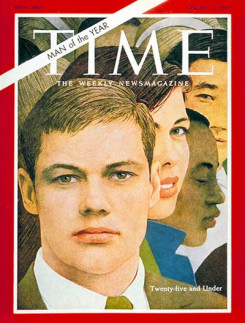Time magazine review of The Sand Pebbles
A Slow Boat to China

The Sand Pebbles is a thought-provoking ad for the American way of political life. In the midst of a war that is continually costing the U.S. more in both money and lives, a major U.S. studio and a major U.S. director, Robert (The Sound of Music) Wise, have invested some $12 million in an angry if indirect attack on U.S. policy in Viet Nam. What's more, they will probably get their money back, even though this film version of Richard McKenna's 1962 bestseller turns out to be just a Panavision placard crammed with peacenik cliches. And besides, it forces the customers to spend 191 minutes aboard a very slow boat to China.
The vessel in question is the San Pablo, a U.S. gunboat all too patently presented as America in microcosm, which has orders to show the flag on China's Yangtze River and shoot, if necessary, to protect American lives during the political uprisings of 1926.
The crew, which seems to stand for the U.S. public, is shown as a lazy collective lummox that just wants to live comfortably. The captain (Richard Crenna), who talks like a Jules Feiffer caricature of Lyndon Baines Jingo, acts at the critical juncture like a militaristic maniac. The hero (Steve McQueen), who is known as Holman, but let that pass, is apparently intended to symbolize fine young men who die in battle needlessly.
What partly redeems the film is the fact that Holman, the San Pablo's engineer, is a somebody as well as a symbol. He is one of those oddly unlonesome loners who flourish in far—places: a rugged individual who knows his own mind and goes his own way. The San Pablo is not going his way. The ship is presented as an instrument of imperialism: the crewmen live like mandarins while coolies do all the work.
Holman quietly insists on doing his own work. Whereupon captain, crew and coolies turn furiously against him. In the last reel, after taking a rueful part in the senseless slaughter of some Chinese peasants, Holman informs the captain that he is through with American militarism, that he is going to desert the colors and help the Chinese build a modern nation. A Chinese bullet prevents the project. "I was home," he gasps as he falls dead. "What the hell happened?"
The viewer may well ask the same question, and the answer in both cases would be the same: he was framed by the man who made this movie. The dubious parallel between China 1926 and Viet Nam 1967 is hammered home again and again with ball-peen bluntness: "All these people want is to be left alone"—"How would you like it if the Chinese had a gunboat on the Mississippi?" Yet Director Wise takes care to make his lecture entertaining. He shrewdly decorates his picture with a bloody wonderful battle sequence, some splendid Taiwan shorescapes, a simperingly pretty leading lady (Candice Bergen), Not to overlook McQueen, a leading man who turns in the sharpest performance of his career. In a picture full of paper tigers, he exudes a none too subtle effluence of tomcat.
Reviewer unknown - January 6, 1967